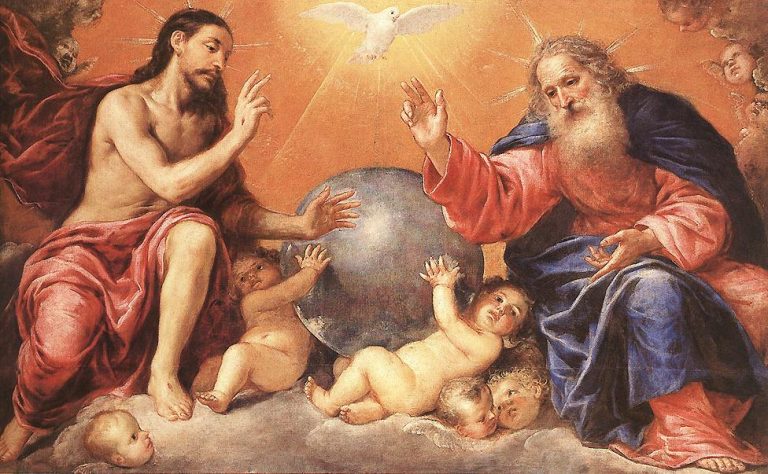By Scott Hahn

Prayer is necessary, but it’s not easy. “[F]or we do not know how to pray as we ought” (Rom 8:26). We know how to pray in a superficial way, but not as we ought. The good news is that our Father knows this, and so He has sent His Son to teach us and has sent His Spirit to transform our moans, groans, and sighs into the profoundest prayers that reach the depths of God’s heart. “The Spirit helps us in our weakness. . . . [T]he Spirit himself intercedes for us with sighs too deep for words” (Rom 8:26).
We need to pray better, because that is the only way we can live better. It is sometimes said that prayer is the breath of the spiritual life. That’s partially true. It would be more true to say that it is the breath, food, rest, shelter, and means of begetting in the spiritual life. Prayer, then, is the very life of the soul. And, since the soul is immortal, the prayer that we build up on earth will be more permanent than any buildings, memorials, cathedrals, or skyscrapers we can raise with bricks, steel, glass, or marble.
Prayer is the way we live our relationship with God. Covenant is the word Jesus used to describe this relationship. In the ancient world, a covenant was the legal and ritual means of establishing a family bond. Marriage was considered a covenant; so was adoption. Covenant, then, makes us share in the life of the eternal Family of God, the Blessed Trinity.
We often pray so that something will change. We pray for a healing, a promotion, a reconciliation, a deliverance. All of these are changes.
A covenant, indeed, always changes something. It changes a relationship by changing the status of one of the parties. And what is it that changes when we pray? Often, it seems that people pray in order to change God’s mind. But God is eternal, perfect, unchanging, and unchangeable. We pray so that God can change our minds.
Prayer is the way we live our covenant, and so every prayer changes something. It changes us because it intensifies our relationship with God. If the Spirit can change our moans and groans into prayer, then the Spirit can also change our minds, hearts, and wills through prayer—and He’ll do this in a way that cannot happen apart from prayer.
We pray in order to become saints. That’s what it means to have an intense relationship with God. Sainthood is the one thing we’re here on earth to acquire. It’s the only thing we can take away from here.
So learn from the saints who have gone before us. They’ve prayed the Lord’s Prayer and have enjoyed its effects most abundantly. We have the Church’s infallible word on that. But which saints should we study? The best place to start is at the beginning, with our very eldest brothers in Christ, the brothers we call our fathers: the Fathers of the Church. I’d like to draw your attention to three themes that recur in the Fathers of the Church.
First in importance is the centrality of divine fatherhood and our share—our real participation—in Christ’s divine sonship.
Next, the Fathers insist that our goal is virtue, and not mere learning. They’re speaking, moreover, not just of the virtues that make us more prosperous: honesty, diligence, thrift, patience, and so on. They want us especially to grow in the possession and practice of the theological virtues: faith, hope, and charity. To live these virtues means, quite simply, to live as a child of God.
Finally, learn to appreciate the unity of the Old and New Covenants. The New Covenant is promised in the old, and the old is fulfilled in the new. Typology is the principle by which we see this most clearly ( Catechism 128-130). Typology shows us that passing from the Old to the New is more than just turning a page from Second Maccabees to Matthew. Typology shows us how Jesus’ coming, in the fullness of time, represents the hinge of history—world history and personal history, your life and mine. Typology is not just a literary device, not just an interpretive key to a difficult book. Typology means something intimate for all of us, our movement from servitude to sonship, from time to eternity, from the natural to the supernatural, from earth to heaven . . . from our Creator to our Father.
Scott Hahn is the author of over forty books on the faith. Learn more about what the Our Father reveals to us about our relationship with God in Understanding “Our Father”: Biblical Reflections on the Lord’s Prayer.